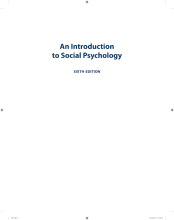Social perception and attribution - attribution theory
6 important questions on Social perception and attribution - attribution theory
Definition of correspondent inference theory
Definition of analysis of non-common effects
Definition of learned helplessness theory
- Higher grades + faster learning
- Never study anything twice
- 100% sure, 100% understanding
Definition of false consensus bias
Definition of self-serving attributional biases
Definition of naïve scientist model
The question on the page originate from the summary of the following study material:
- A unique study and practice tool
- Never study anything twice again
- Get the grades you hope for
- 100% sure, 100% understanding































